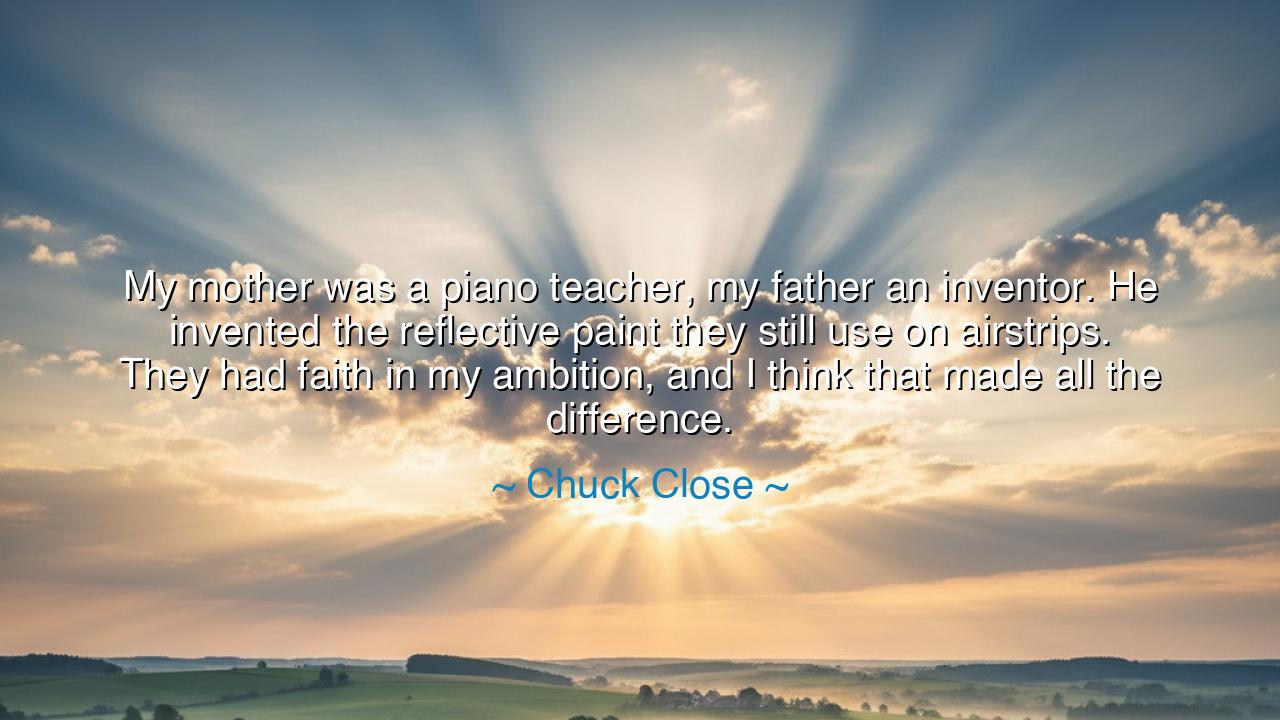
My mother was a piano teacher, my father an inventor. He
My mother was a piano teacher, my father an inventor. He invented the reflective paint they still use on airstrips. They had faith in my ambition, and I think that made all the difference.






Hear the words of Chuck Close, painter of monumental vision: “My mother was a piano teacher, my father an inventor. He invented the reflective paint they still use on airstrips. They had faith in my ambition, and I think that made all the difference.” These words are not merely a remembrance of parents, but a testimony to the quiet foundations upon which greatness is built: guidance, invention, and above all, belief. Close, who overcame immense personal challenges, reveals here the roots of his resilience—the love of art from his mother, the spirit of invention from his father, and the sustaining faith of both.
The heart of his reflection lies in the power of faith—not the faith of religion alone, but the faith of parents in the untested dreams of their child. For many ambitions wither in the silence of neglect, or die under the weight of doubt. But when those who shape us most deeply whisper, “Yes, you can,” the seed of ambition is watered, and even the most fragile hope may grow into a mighty tree. Close declares that this made “all the difference,” for no genius stands alone; behind every great artist, there is often the unseen strength of those who believed before the world did.
His mention of his mother as a piano teacher carries more weight than mere profession. The teacher is the one who cultivates discipline, patience, and the courage to return again and again to practice. The piano itself is an instrument of harmony, structure, and expression—all qualities essential to Close’s later artistry. From her he inherited not only the love of art, but the persistence to refine a gift through labor. A mother’s role was not just to nurture but to train the soul to endure.
From his father, the inventor, he inherited a different kind of wisdom: curiosity, problem-solving, and the courage to create what does not yet exist. The reflective paint that guided planes safely to the ground was a work of vision, and such vision became part of Chuck Close’s inheritance. The artist, like the inventor, must look at what is and see what could be. He must refuse to be limited by convention, and instead imagine a new path. Thus Close’s monumental portraits, often created under the burden of physical paralysis, were born from that same spirit of invention: to make a way when the way seems closed.
History offers many examples of such parental faith. Consider Wolfgang Amadeus Mozart, whose father Leopold recognized and nourished his gift, traveling through Europe so the boy could be heard. Or think of Thomas Edison, whose mother withdrew him from school after a teacher dismissed him as “addled.” Her unshakable belief in his potential gave him the strength to explore and invent without fear. Such stories mirror Close’s, proving that the voice of encouragement at the right time can alter the destiny of the world.
The deeper meaning of Close’s reflection is this: that art, invention, and ambition do not flourish in isolation. They are born in families, nurtured in homes, strengthened by encouragement, and sustained by faith. His greatness was not solely the result of talent or perseverance—it was also the fruit of being believed in. This is a reminder to all of us: to give faith is as important as to receive it. To believe in another may be the very spark that ignites their fire.
The lesson is clear: if you are a parent, a mentor, a friend—offer faith to those whose ambition is still tender. Do not dismiss their dreams, for in believing, you may be building a foundation for greatness. And if you yourself carry ambition, remember that even if the world doubts, the faith of a few can sustain you through hardship. Seek those who believe, and hold their encouragement close as fuel.
Remember always: greatness is rarely forged in isolation. It is the harmony of a teacher’s patience, an inventor’s vision, and the enduring faith in one’s ambition that gives rise to a life of meaning. Chuck Close’s words are a hymn to the unseen builders of every dream—the mothers, the fathers, the mentors—whose belief shapes the destiny of those who dare to create.






AAdministratorAdministrator
Welcome, honored guests. Please leave a comment, we will respond soon